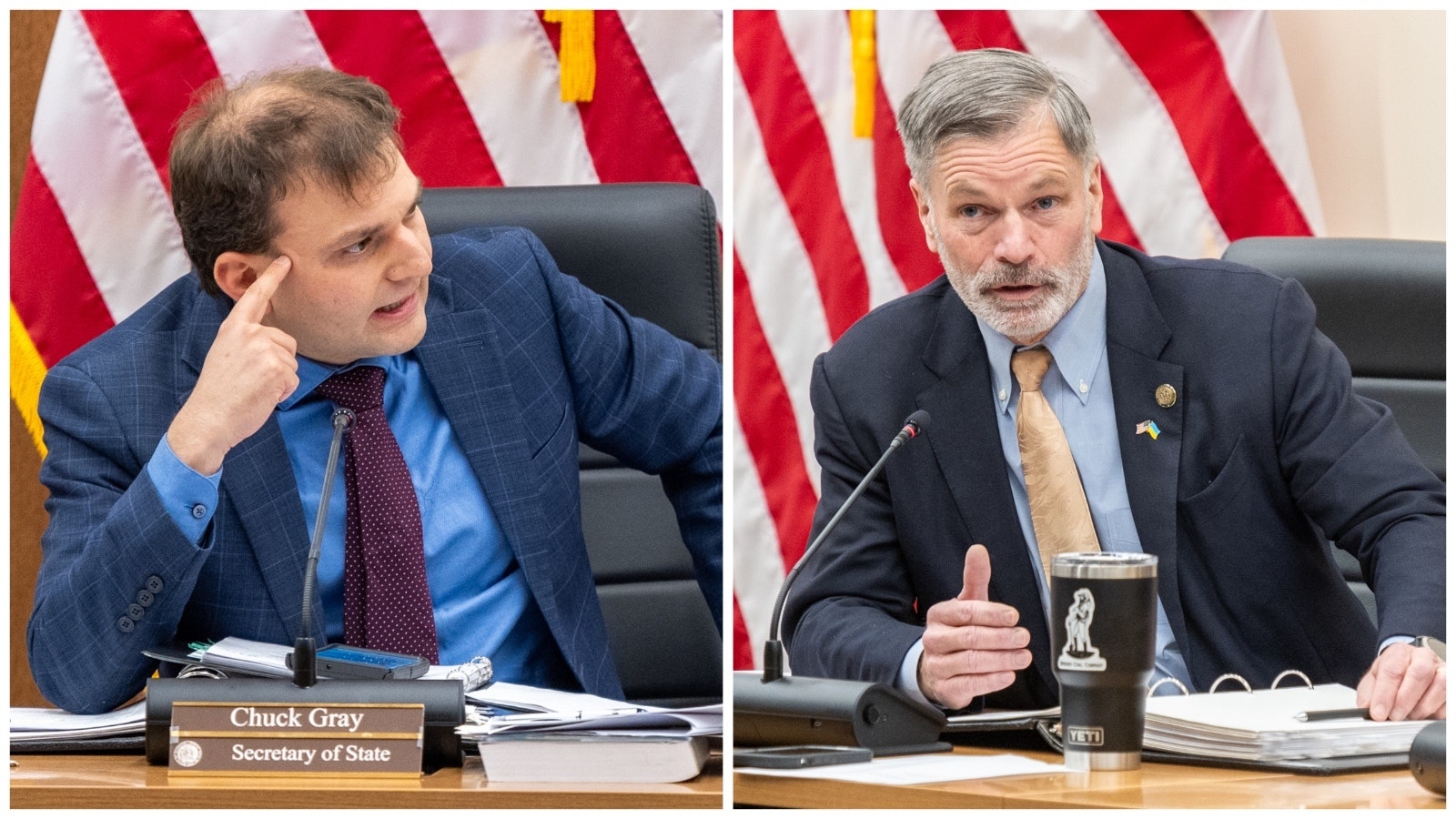Gov. Mark Gordon is vetoing some of Secretary of State Chuck Gray’s proposed rules on environmental, social and governance (ESG) investing in Wyoming, in some circles referred to as “woke investing.”
Gray’s rules would have required investment brokers, broker dealers and securities agents doing business with Wyoming to disclose if ESG principles factor into their business decisions.
ESG measures rate funds on various markers of policies related to protecting the environment, diversity in the workplace and community relations.
In total, Gordon issued 12 line-item vetoes of Gray’s proposed rules. There are some sections of the rules that are being allowed to go into effect Tuesday.
Gray disagrees with Gordon’s decision to veto parts of the rules, telling Cowboy State Daily he believes the governor is “recycling incorrect, used talking points made by the radical left and Wall Street elites,” as he did when appearing on the CBS News show “60 Minutes” in December.
“I am disappointed to see the governor’s rationale has adopted the wrong talking points of the radical left and Wall Street elites, rather than sound legal arguments,” Gray said.
The crux of Gray’s argument and his rules is that investment professionals who promote investing with ESG guidelines without obtaining their clients’ approval or notice are engaging in deceitful and possibly fraudulent conduct.
Gray said he was given no prior warning that Gordon would be making his vetoes, which he had to make by Tuesday.
Not Allowed
Gordon said the sections of Gray’s rules he has vetoed are outside the scope of regulatory authority guaranteed under Wyoming law and likely “runs afoul” of federal securities law and principles of preemption.
“While I agree that ESG investment guidance is improper and misleading, the answer to too much government interference in our lives is not more government,” Gordon said in a Tuesday press release announcing the line-item vetoes. “No government should have the right to direct people’s personal investment strategies.”
In a Tuesday letter sent to Secretary Gray, Gordon notes that by law he can only approve rules within the bounds set by statute. In the case of the proposed rules addressing ESG investing, the statute does not allow the government to tell people how to invest their money.

A Rare Move
As the governor, Gordon gets the final say over approving any proposed agency rules.
Former Gov. Dave Freudenthal told Cowboy State Daily he never vetoed any proposed agency rules during his time as governor and couldn’t remember a time when his successor, former Gov. Matt Mead, did so either.
Gray has carried a much more public-facing and advocacy-oriented persona than his predecessor, Ed Buchanan. Outside the governor, Wyoming’s other statewide officials typically haven’t strayed far from the positions expressed by the governor’s office, and if they have, rarely did so publicly.
Gray described Gordon’s letter as “defensive” and lacking “real leadership.”
“ESG investments are a malicious attack on Wyoming’s core industries and our entire way of life,” Gray said. “With an increasing trend of mutual funds and brokerage firms being pressured by woke politicians to offer investment products which employ ESG principles, we must take a concrete, proactive approach to protect our state and consumers.”
Them's The Rules
Gordon said he sees ESG as “a thinly veiled attempt to inject unwarranted political ideology into the lives of everyday Wyoming citizens.”
He’s working on a multi-state coalition led by Florida Republican Gov. Ron DeSantis to coordinate state-level efforts to oppose ESG nationally and state Attorney General Bridget Hill has joined a 25-state coalition suing the federal Department of Labor over proposed rules to guide the investment of retirement funds in ESG-related causes.
“We believe ESG mandates violate otherwise well-established and proper fiduciary responsibilities to the best interests of clients,” Gordon wrote in his Tuesday letter to Gray.
But he also said these efforts don’t justify rules that go beyond a state agency’s legal authority, as he asserts Gray’s do.
The Wyoming Securities Act stipulates that the secretary of state can adopt and amend rules "necessary and appropriate to carry out” in order for people to invest within the state.
In his letter, Gordon warns that Gray’s rules could impose unnecessary and burdensome state oversight into customer choices. He sees Gray’s rules as telling people how to invest their money and is “an affront to personal choice and a free market” and an invasion of “personal responsibility and liberty.”
“The consumer protection required by Wyoming and federal law speaks to transparency and disclosure only,” Gordon said in his press release. “Informed consumers should have the freedom to make their own investment choices.”
Gray disagrees and said there is no federal law that explicitly prevents required investment disclosures. He sent two letters over the past seven months to the governor defending his rules and disputing legal analysis provided by the Legislative Service Office (LSO).
“As the proposed rules are acting to require disclosure, they fundamentally are concerned with the prevent of “fraud and deceit” which is explicitly reserved to the states by federal law,” Gray wrote in a January letter to Gordon.
The LSO analysis was provided to the Legislature’s Management Council, which passed a recommendation to not approve the rules. Senate Majority Floor Leader Larry Hicks, R-Baggs, Sen. Dave Kinskey, R-Sheridan, and Majority Floor Leader Rep. Chip Neiman, R-Hulett, voted against.

What Does Wyoming Law Say?
The Wyoming Securities Act, which oversees investing protocols in Wyoming, does not dictate how exactly consumers must make their personal investment decisions or that they must maximize their investment returns.
As long as a client has been provided information about his potential investment decisions from an investment professional about their investments, state law does not clarify any further requirements on these professionals.
In January, Gray wrote that his rules provide a “common-sense approach” to protecting investors by providing more transparency to the investment decisions they are making.
The Securities Act does, however, address the dissemination of relevant information to clients by investment professionals and disclosures necessary to help ensure compliance with fiduciary duties and combat fraud.
It also allows the secretary of state to “define an act, practice our course of business of an investment adviser or an investment adviser representative … as fraudulent, deceptive or manipulative, and prescribe means reasonably designed to prevent investment advisers and investment adviser representatives … from engaging in acts, practices, and courses of business defined as fraudulent, deceptive or manipulative” and to “specify the contents of an investment advisory contract entered into, extended, or renewed by an investment adviser.”
Gordon said there is a critical difference between warning against fraud and warning against ESG.
“Combating fraud through honest disclosure is different and distinct from prescribing how Wyomingites must consent to investment decisions regarding ‘social criteria,’” Gordon wrote. “A reasonable person would construe the former to be beneficial, while the latter requirement constitutes improper government intrusion into decisions that are intensely personal.”
Gordon said substantially similar rules to what Gray proposed were adopted by Missouri Secretary of State John Ashcroft last summer, who allegedly encouraged Wyoming to follow his lead.
“While other states may choose to test the limits of regulatory authority, Wyoming is a conservative and prudent state not prone to impulsively testing the limits of legal propriety, especially when others are already in the field,” Gordon wrote.
A public comment hearing was held on Gray’s proposed rules last September and he officially submitted his rule proposal to Gordon in December.
Some Parts Allowed
There are certain sections of Gray’s rules that Gordon is allowing to go into effect.
He is allowing “social criteria” to be defined as any criterion that is intended to further international, domestic or industry agreements relating to environmental or social goals, corporate governance structures based on social characteristics, or social or environmental goals.
If a broker-dealer incorporates a social objective into a discretionary investment decision to buy or sell a security or commodity for a customer or client, then this person still must disclose to the customer the existence of such incorporation. How this disclosure must be made was vetoed from the rules.
Although Gray said Gordon’s vetoes significantly weakened his rules, he also said the final rules still offer a starting point to address the topic of what he describes as managing the “radical, clown-show ESG agenda on our state.”
Leo Wolfson can be reached at leo@cowboystatedaily.com.





